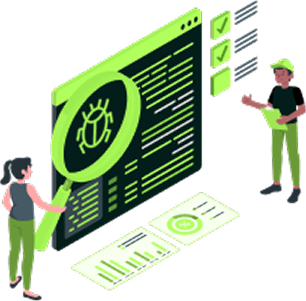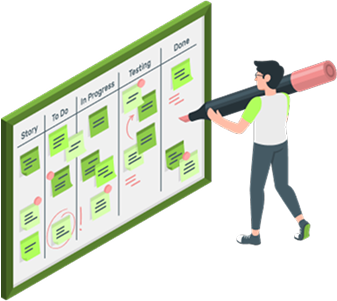Nearshore IT Staff Augmentation: Hire Top Latin American Developers
Our Nearshore IT Staff Augmentation services help businesses scale fast by hiring pre-vetted software engineers from Latin America. Work in your time zone, reduce costs, and integrate top developers seamlessly into your team without the delays and risks of traditional hiring.

What is Nearshore IT Staff Augmentation?
Nearshore IT staff augmentation is a flexible, cost-effective solution for scaling development teams with skilled engineers from nearby countries. It offers on-demand access to top talent, working in your time zone, aligning with your culture, and seamlessly integrating into your team—without the delays and costs of traditional hiring.

Key Benefits of
Nearshore
IT Staff
Augmentation
With ParallelStaff’s nearshore IT staff augmentation, you get reliable, high-performing developers who deliver faster, more efficient software solutions—helping your company stay ahead in today’s competitive market.
Work in real-time with developers in U.S. time zones.
Same Time Zone Collaboration
Onboard pre-vetted developers in 2 weeks or less.
Faster Hiring & Onboarding
Reduce expenses related to recruitment, salaries, and benefits while maintaining high development standards.
Cost Savings Without Quality Sacrifice
Find Your Nearshore Developers Today
Why IT Staff Augmentation Outperforms Project Outsourcing
Software Project Outsourcing
- Limited control over project execution.
- Vendor manages project scope, delivery, and quality.
- Vendor provides a full team with required skills.
- Best for defined projects with clear deliverables.
- Fixed price or milestone-based cost structure.
- Longer setup time due to planning and contracts.
- Vendor assumes most of the risks.

IT Staff Augmentation
- Full control over team and processes.
- Client manages, augmented staff integrates.
- Client selects and manages skilled professionals.
- Ideal for scaling without long-term commitments.
- Hourly or monthly rates per developer.
- Faster onboarding of talent.
- Client retains responsibility for project risks.
Want to know what’s the best for your project?
Which Developers Are
The Right Fit for Your Project?
Nearshore IT Staff Augmentation connects businesses with top Latin American developers for real-time collaboration and faster hiring. With same-time-zone availability, ParallelStaff delivers pre-vetted engineers in 2 weeks or less, ensuring seamless communication, reduced costs, and scalable IT solutions.
Feature
Nearshore IT Staff Augmentation
Offshore IT Staff Augmentation
Offshore IT Staff Augmentation
Time Zone Compatibility
Works in your time zone for real-time collaboration.
Enables round-the-clock progress with global teams.
Communication & Workflow
Seamless collaboration with minimal language and cultural barriers.
Asynchronous work cycles optimize handoffs for 24/7 development.
Cost Efficiency
Reduces recruitment, training, and operational costs while offering competitive rates vs. onshore resources.
Maximum cost savings for long-term development needs.
Project Suitability
Best for agile teams, high-collaboration projects, and ongoing IT support.Ideal for large-scale, long-term development projects requiring continuous work.
Ideal for large-scale, long-term development projects requiring continuous work.
Strategic business Focus
Delegating development tasks to a nearshore IT team allows internal teams to focus on core business initiatives.
Delegating development offshore allows businesses to prioritize strategy and innovation.
Security & Compliance
Enterprise-grade protection with encrypted systems, secure VDIs, and VPN access under our 4X Guarantee.
Enterprise-grade protection with encrypted systems, secure VDIs, and VPN access under our 4X Guarantee.
Talent Pool
Access to skilled nearshore software developers, QA engineers, and DevOps specialists.
Access to a global talent pool of skilled offshore developers, particularly in Eastern Europe.
Nearshore
Outsourcing Countries
Mexico

Developer Strengths
Proficient in software development, IT services, cybersecurity, and emerging technologies like AI and IoT.
Time Zone Alignment
Spans multiple zones: Pacific Time (PT, UTC−8), Mountain Time (MT, UTC−7), Central Time (CT, UTC−6), and Eastern Time (ET, UTC−5).
What Makes It Unique
Home to Guadalajara, known as the “Silicon Valley of Mexico”, with a thriving tech ecosystem.
Brazil

Developer Strengths
Specialized in mobile app development, fintech solutions, cloud computing and AI.
Time Zone Alignment
Primarily aligns with Eastern Time (ET, UTC-5) and Central Time (CT, UTC-6).
What Makes It Unique
Host one of the world’s largest Java developer communities, SouJava.
Argentina

Developer Strengths
Expertise in software development, blockchain technology, and fintech technologies.
Time Zone Alignment
Aligns with Eastern Time (ET, UTC-5).
What Makes It Unique
Offers favorable currency exchange rates, making it cost-effective for outsourcing..
Colombia

Developer Strengths
Skilled in software development, mobile technologies, and gaming.
Time Zone Alignment
Matches Eastern Time (ET, UTC-5).
What Makes It Unique
Government initiatives are bolstering the rapidly growing tech sector.
Chile

Developer Strengths
Proficient in web development, fintech, and AI.
Time Zone Alignment
Aligns with Eastern Time (ET, UTC-5) and Central Time (CT, UTC-6).
What Makes It Unique
Stable economy and government-backed tech incentives make it ideal for outsourcing.
Peru

Developer Strengths
Competent in software development, IT support, and data analytics.
Time Zone Alignment
Matches Eastern Time (ET, UTC-5).
What Makes It Unique
Government support for tech education is expanding the talent pool.
Uruguay

Developer Strengths
Specialized in blockchain, SaaS, and web development.
Time Zone Alignment
Aligns with Eastern Time (ET, UTC-5).
What Makes It Unique
Political stability and government incentives attract IT companies.
Costa Rica

Developer Strengths
Experienced in web development, data analysis, and cloud computing.
Time Zone Alignment
Matches Central Time (CT, UTC-6).
What Makes It Unique
Government-backed tech training programs enhance talent quality.
Panama

Developer Strengths
Skilled in cybersecurity, software development and cloud technologies.
Time Zone Alignment
Matches Eastern Time (ET, UTC-5).
What Makes It Unique
Strong financial and logistics infrastructure supports tech growth.
Guatemala

Developer Strengths
Proficient in software development, IT services, and blockchain.
Time Zone Alignment
Matches Central Time (CT, UTC-6).
What Makes It Unique
Government investment in tech education is developing the workforce.
El Salvador

Developer Strengths
Focused on software development, IT support, and blockchain.
Time Zone Alignment
Matches Central Time (CT, UTC-6).
What Makes It Unique
Recent tech initiatives, including Bitcoin adoption, are attracting global attention.
Honduras

Developer Strengths
Growing expertise in software development and IT services.
Time Zone Alignment
Matches Central Time (CT, UTC-6).
What Makes It Unique
Cost-effective talent with a strong work ethic.
Ecuador

Developer Strengths
Proficient in software development, cloud technologies, and IT services.
Time Zone Alignment
Matches Eastern Time (ET, UTC-5).
What Makes It Unique
Government support for tech education is fostering a skilled workforce.
Bolivia

Developer Strengths
Emerging talent in software development and IT support.
Time Zone Alignment
Aligns with Eastern Time (ET, UTC-5).
What Makes It Unique
Competitive rates make it an attractive outsourcing destination.
Paraguay

Developer Strengths
Developing skills in software development and cybersecurity.
Time Zone Alignment
Aligns with Eastern Time (ET, UTC-5).
What Makes It Unique
Government incentives are boosting the IT sector’s growth.
Dominican Republic

Developer Strengths
Skilled in software development, fintech, cloud computing, and IT services.
Time Zone Alignment
Matches Atlantic Time (AT, UTC-4), aligning with Eastern Time during daylight savings.
What Makes It Unique
Home to one of the most advanced IT outsourcing industries in the Caribbean, with strong English proficiency.
Nicaragua

Developer Strengths
Growing expertise in software development and IT services.
Time Zone Alignment
Matches Central Time (CT, UTC-6).
What Makes It Unique
The software market in Nicaragua is projected to grow significantly, indicating a rising tech industry.
Puerto Rico

Developer Strengths
Bilingual developers skilled in software development and AI-driven solutions.
Time Zone Alignment
Matches Atlantic Time (AST, UTC-4), aligning with Eastern Time during daylight savings.
What Makes It Unique
Ranked among the top AI service providers in Latin America, with projected $312 million software market by 2024.
How to get started with our
Software Development Services
Initial Consultation – Understanding Your Needs
We assess your project requirements, technical needs, and team structure to match you with the best talent.
STEP 1
Talent Selection – Finding Your Perfect Match
We handpick pre-vetted software engineers with the right skills, experience, and cultural fit for seamless integration.
STEP 2
Seamless Integration & Onboarding
Our developers quickly adapt to your workflows, tools, and communication channels, ensuring a smooth transition.
STEP 3
Continuous Collaboration & Performance Optimization
We provide ongoing support, regular check-ins, and Agile best practices to maximize productivity and quality.
STEP 4
Scale as Needed – Flexibility to Grow or Adjust
Easily expand or adjust your team as project needs evolve, ensuring flexibility and long-term success.
STEP 5
Let’s get you started
TESTIMONIALS
See What Our Clients &
Partners Are Saying

Parallel Staff has provided excellent service and is always professional. We have used them for over 3 years and have always had excellent customer service; I highly recommend them to anyone looking to simplify their nearshore outsourcing.
Ramiro Rodriguez

We have thoroughly enjoyed and appreciated our partnership with the Parallel Staff team. They have connected us with high-quality engineers who fit our team culture and add value to our technical work in a seamless way. We have also been impressed by the high caliber of communication and collaborati...
Hannah Geesey

Fast, professional communication and high-quality candidates have made Parallel Staff a valuable part of our strategy.
Rob Williams

I have been working with ParallelStaff for over one year, and they have exceeded my expectations! I worked with them to hire several talented Java Developers and Java SDET consultants in Latin America for our software development project in a tight timeframe. I greatly appreciate ParallelStaff’s ded...
Nicole Nelson

Our experience with this nearshore company has been exceptional. Their ease of communication through platforms like Slack, provision of high-quality workers, and competitive pricing are testaments to their dedication and professionalism. We look forward to continuing this partnership and are confide...
Zach Gomez

The developers I work with through Parallel Staff are all extremely knowledgeable, friendly, and accountable.
Richard Lebron

My experience has been very positive as they are accommodating and always responsive to our needs. I am impressed with their efforts to quickly find highly qualified individuals across a broad spectrum of technical profiles.
Marie Magnelli
My experience has been very positive as they are accommodating and always responsive to our needs. I am impressed with their efforts to quickly find highly qualified individuals across a broad spectrum of technical profiles.

Marie Magnelli
Our experience with this nearshore company has been exceptional. Their ease of communication through platforms like Slack, provision of high-quality workers, and competitive pricing are testaments to their dedication and professionalism. We look forward to continuing this partnership and are confident that it will bring continued success to our projects.

Zach Gomez
Fast, professional communication and high-quality candidates have made Parallel Staff a valuable part of our strategy.

Rob Williams
The developers I work with through Parallel Staff are all extremely knowledgeable, friendly, and accountable.

Richard Lebron
I have been working with ParallelStaff for over one year, and they have exceeded my expectations! I worked with them to hire several talented Java Developers and Java SDET consultants in Latin America for our software development project in a tight timeframe. I greatly appreciate ParallelStaff’s dedicated partnership and excellent communication skills during the recruiting process and duration of the software development project. I highly recommend working with ParallelStaff!

Nicole Nelson
We have thoroughly enjoyed and appreciated our partnership with the Parallel Staff team. They have connected us with high-quality engineers who fit our team culture and add value to our technical work in a seamless way. We have also been impressed by the high caliber of communication and collaboration between our teams. The recruiters and account managers we have interacted with are punctual, friendly, very helpful, and extremely responsive. We consider Parallel Staff a valued partner!

Hannah Geesey
Power Up Your Development Team
with IT Nearshore Staff Augmentation
At ParallelStaff, we provide expert IT Nearshore Staff Augmentation solutions, connecting you with highly skilled software professionals from Latin America. Our developers, DevOps engineers, and specialists seamlessly integrate into your team, ensuring faster delivery, exceptional quality, and scalable growth, without the complexities of traditional hiring.

Front-End Developers
Specializing in frameworks like React, Angular, or Vue.js for building user interfaces.

Back-End Developers
Expertise in languages like .NET, Java, Python, Ruby, Node.js, and PHP.

Full-Stack Developers
Proficient in both frontend and backend technologies for end-to-end development.

UI/UX Designers
Designers are skilled in creating user-friendly and visually appealing interfaces.

Mobile Apps Developers
iOS and Android specialists, including React Native and Flutter developers.

QA Engineers
Manual and automated testing experts to ensure software quality.

Cybersecurity Engineers
Ensuring the security of applications and systems.

Game Developers
Specialists in Unity, Unreal Engine, or other platforms for game development.

Database Administrators
Managing and optimizing SQL and NoSQL databases.

DevOps Engineers
Focusing on CI/CD pipelines, cloud infrastructure, and system automation.

Cloud Engineers and Architects
Specialists in AWS, Azure, Google Cloud, and hybrid cloud solutions, focusing on architecture, deployment, and optimization.

E-Commerce Developers
Skilled in platforms like Shopify, Magento, WooCommerce, and BigCommerce for building and optimizing online stores.

CMS Developers
CMS developers build and customize websites using platforms like WordPress and Drupal, focusing on functionality and performance.

Data Engineers
Handling data pipelines, ETL processes, and database optimization.

Data Scientists
Experts in machine learning, data modeling, and predictive analytics.

AI/ML Engineers
Developing intelligent systems, machine learning models, natural language processing, and AI-driven applications.

Scrum Masters & Product Owners
Agile project management professionals to facilitate team collaboration.

Project Managers (PM) and Business Analysts (BA)
Bridging the gap between technical teams and business stakeholders.

Technical Support Specialists
Providing ongoing maintenance and support for deployed solutions.

ERP Developers
Customizing and maintaining systems like SAP, Oracle, or Dynamics.

Blockchain Developers
Focused on smart contracts, decentralized applications, and cryptocurrencies.
Want to see if we have the tech talent you're craving?
Explore Our
Insights & Trends

Nearshore Trends
Read Time: 5min
Full Guide – Nearshore Staff Augmentation Explained
Discover key strategies to build scalable software with offshore teams, optimizing flexibility, communication, and results.

Nearshore Trends
Read Time: 5min
Strategic Solutions: Navigating Nearshore Outsourcing for Optimal Results
Explore the nearshore development trends that will shape the future of software projects in 2025.

Nearshore Trends
Read Time: 5min
Guide to Managing Nearshore Partner Relationships
Learn how to guarantee software quality and improve efficiency by leveraging nearshore development strategies.
Stay Informed with Our Latest Insights
Nearshore IT Staff Augmentation
Frequently Asked Questions
What is Nearshore IT Staff Augmentation?
IT Staff Augmentation is a flexible hiring model that enables businesses to enhance their development teams by integrating external software professionals. This approach allows companies to scale quickly, access specialized skills, and maintain control over their projects without the long-term commitments of full-time hiring.
How is Nearshore IT Staff Augmentation different from traditional outsourcing?
IT Staff Augmentation provides businesses with dedicated developers who work alongside in-house teams, following existing processes and management structures. In contrast, traditional outsourcing involves a third-party vendor managing entire projects, often with limited client oversight and control.
What are the benefits of Nearshore IT Staff Augmentation?
10 days or less! Our streamlined hiring process ensures that businesses can quickly onboard highly skilled, pre-vetted developers, reducing downtime and accelerating project delivery.
How quickly can ParallelStaff provide developers for my team?
We can match you with pre-vetted engineers within days, ensuring rapid onboarding and minimal downtime for your projects.
What roles can I augment with ParallelStaff?
We provide highly skilled professionals across various roles, including:
- Frontend & Backend Developers (React, .NET, Node.js, etc.)
- Full-Stack Engineers
- DevOps & Cloud Specialists
- QA & Automation Testers
- Data Engineers & AI Specialists
What industries does ParallelStaff specialize in?
We serve a wide range of industries, including:
- FinTech & Banking – Secure, scalable financial solutions.
- Healthcare & MedTech – HIPAA-compliant software development.
- E-commerce & Retail – Scalable online platforms & payment systems.
- SaaS & Cloud Solutions – Custom software products & cloud services.
- Logistics & Supply Chain – AI-driven optimization & automation.
How does ParallelStaff ensure quality and reliability?
We rigorously vet all engineers for technical skills, problem-solving ability, and communication proficiency. Our teams follow Agile and DevOps best practices, with ongoing performance tracking and quality assurance.
What time zones do ParallelStaff developers work in?
Our nearshore teams operate in U.S. time zones (Pacific, Mountain, Central, and Eastern), ensuring real-time collaboration and faster response times compared to offshore alternatives.
What’s the difference between outsourcing and staff augmentation?
Yes! ParallelStaff provides full flexibility, allowing you to scale up or down based on your project needs—whether for short-term engagements or long-term growth.
How do I get started with ParallelStaff’s Nearshore IT Staff Augmentation?
Simply schedule a free consultation, and we’ll assess your needs, match you with the right talent, and get your team up and running in record time!
HIRE Elite Tech Talent. Fast. Guaranteed.
Book a discovery call to connect with fully vetted nearshore or offshore engineers matched to your team, your stack, and your goals.
- Onboard in 10 days or less
- 14-day risk-free trial
- Deep role specialization
- Lifetime recruitment guarantee
If you have any additional questions, please email our team directly or call us at:


